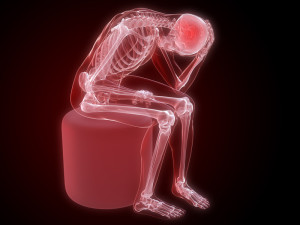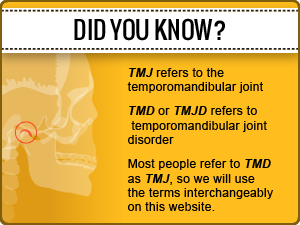Jaw pain, muscle soreness, ear ringing, and…dentistry? How it all relates
 Many people do not realize how much impact the mouth can have on the rest of the body. The muscles and tissue in the immediate area of the jaw are much stronger than we often assume. What this means is that disorders in the temporo-mandibular joint can result in unrecognized symptoms that may appear as some other medical problem.
Many people do not realize how much impact the mouth can have on the rest of the body. The muscles and tissue in the immediate area of the jaw are much stronger than we often assume. What this means is that disorders in the temporo-mandibular joint can result in unrecognized symptoms that may appear as some other medical problem.
Migraine headaches are perfect examples. Many people who suffer from migraines think any medical problem is associated with the aching area of the head, when in fact it can be the result of pressure created by a TMJ disorder.
TMJ jaw pain explained
Jaw pain is a general indicator that there is some type of disorder or alignment problem in the TMJ. Misalignment is common, but arthritis and osteoarthritis are also examples of medical conditions known to cause jaw pain in some instances.
Pain is not necessarily confined to one side of the jaw in either event. Jaw pain can also be associated with a heart attack or angina in certain cases, but more often than not, jaw pain causation is usually located in the TMJ.
Why your ears may be ringing
Ringing ears is also a condition that is not normally associated with jaw disorders. While this can be a symptom of the ear disorder tinnitus, ringing ears can also be caused by the TMJ. Other symptoms can also arise, as some patients experience throbbing or pulsating pain in addition to ringing ears.
The TMJ joint is one of the most complex regions of the body, and is actually hinged just below the ear. Ringing ears tends to be one of the most common symptoms with TMJ patients, but the symptom can also be an indication of other problems.
How TMJ causes muscle soreness
Muscle soreness is also very common for patients with a TMJ disorder, and physiologic dentistry can often provide an effective diagnosis and treatment regimen. Once again, the complexity of the body region surrounding the ear means that there are multiple medical disorder possibilities.
Muscle soreness is a symptom of unusual pressure being placed on the muscles connected to the TMJ . Very often the soreness will go away after the TMJ is effectively treated.
Do you have TMJ?
If you are suffering from pain or discomfort in these regions of the body a physiologic dentistry professional will be able to help diagnose the problem and provide an accurate prognosis.
If you would like to learn more about how TMJ might be affecting you, please take my free questionnaire.


